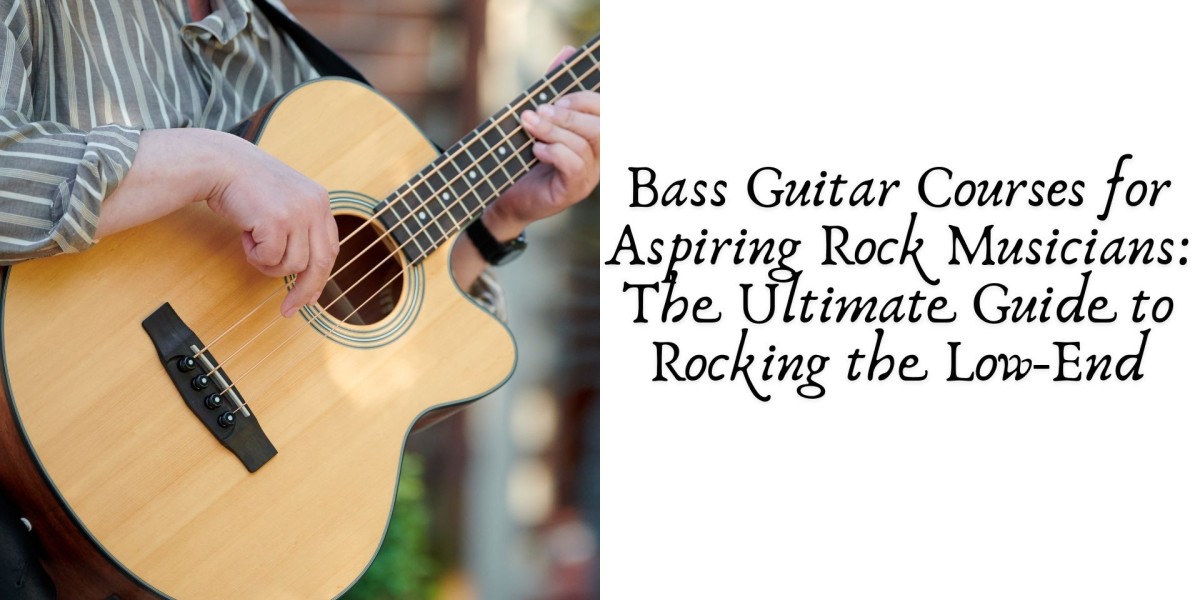For every great rock band, there’s a bassist holding down the groove, laying the foundation, and adding depth to the sound that fans love. Whether it's the thunderous lines of John Paul Jones (Led Zeppelin), the melodic runs of Paul McCartney (The Beatles), or the raw energy of Flea (Red Hot Chili Peppers), the bass guitar is a critical force in rock music. If you dream of standing on stage with your bass strapped low and your fingers moving with confident precision, then finding the right bass guitar course for aspiring rock musicians is your first step toward that dream.
In this article, we dive deep into how a focused bass guitar course can shape your skills, boost your confidence, and help you rock the stage.
Why Choose Bass Guitar in Rock Music?
Before diving into course options, it's essential to understand why the bass guitar matters in rock music:
Rhythmic Backbone: The bass connects the drums with the melody, bridging rhythm and harmony.
Groove Mastery: Rock depends on groove. From walking bass lines to driving eighth notes, bassists keep heads bobbing.
Underrated Star Power: A skilled bassist may not always be in the spotlight, but they’re always at the heart of the sound.
For aspiring rock musicians, learning bass offers a direct route into bands and jam sessions because bassists are often in high demand but fewer in number.
Key Elements of a Great Rock Bass Course
Not all bass guitar courses are created equal. If you're aiming for rock greatness, here’s what your ideal course should offer:
Rock Genre-Specific Curriculum
A solid course for aspiring rock bassists should focus on:
Classic rock grooves (e.g., AC/DC, Queen, The Rolling Stones)
Punk and alternative rock bass lines (e.g., The Clash, Nirvana)
Hard rock and metal techniques (e.g., Black Sabbath, Metallica)
Indie and post-rock textures
Look for modules that teach techniques in context, using iconic rock tracks.
Technique Building
Rock bass may sound simple, but it demands strong technique:
Fingerstyle plucking
Pick usage
Hammer-ons, pull-offs, and slides
Palm muting and aggressive attack
Right-hand stamina and speed
Courses should balance foundational drills with practical, song-based learning.
Play-Along Tracks and Backing Jams
Interactive learning is key. Leading courses offer downloadable backing tracks, enabling students to:
Practice timing with real instruments
Develop confidence performing full-length rock songs
Build improvisation skills
Performance and Recording Skills
Many modern courses include modules on:
Stage presence and live setup
Gear knowledge (amps, pedals, bass types)
Recording your bass at home
Playing with bands and syncing with drummers
Benefits of Taking a Bass Guitar Course for Rock
Faster Learning Curve: Guided lessons reduce trial and error.
Structured Progression: You move from beginner to advanced with milestones.
Confidence Boost: Mastery of songs and technique helps you play with others.
Band-Readiness: Learn what it takes to lock in with a drummer and contribute creatively.
Creative Outlet: Writing your own bass lines is easier once you know the rules.
Tips for Getting the Most Out of Your Course
Practice Regularly: 30–60 minutes a day is more effective than long, infrequent sessions.
Record Yourself: Listen back to catch timing issues and tone inconsistencies.
Join Jam Sessions: Playing with others accelerates your growth.
Learn Full Songs: Don’t just loop riffs—learn structure, dynamics, and endings.
Stay Inspired: Create playlists of iconic rock bassists to fuel your passion.
Conclusion: Start Rocking Your Bass Journey Today
The road to becoming a rock bassist is thrilling and filled with opportunities for creative expression and performance. A good bass guitar course for aspiring rock musicians is more than a series of lessons—it’s a toolkit that equips you for the stage, studio, and beyond.
Whether you aim to play classic covers, jam with friends, or form your own band, starting with the right training will make all the difference. Plug in, turn up the volume, and let the bass lines roll—your journey to rock greatness starts now. ??







